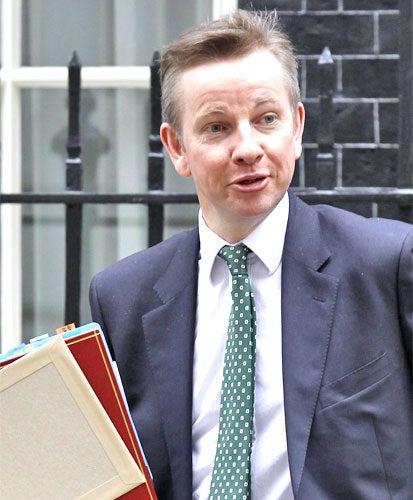Gove scraps watchdog that was meant to discipline teachers

Your support helps us to tell the story
From reproductive rights to climate change to Big Tech, The Independent is on the ground when the story is developing. Whether it's investigating the financials of Elon Musk's pro-Trump PAC or producing our latest documentary, 'The A Word', which shines a light on the American women fighting for reproductive rights, we know how important it is to parse out the facts from the messaging.
At such a critical moment in US history, we need reporters on the ground. Your donation allows us to keep sending journalists to speak to both sides of the story.
The Independent is trusted by Americans across the entire political spectrum. And unlike many other quality news outlets, we choose not to lock Americans out of our reporting and analysis with paywalls. We believe quality journalism should be available to everyone, paid for by those who can afford it.
Your support makes all the difference.The body responsible for disciplining teachers is to be abolished as the Government intensifies its war on quangos.
The Education Secretary Michael Gove told MPs yesterday he was "deeply sceptical" about the purpose of the General Teaching Council (GTC), saying it "does little to raise teaching standards or professionalism".
The GTC was set up by Labour a decade ago with a remit to act as the profession's police force – in much the same way as the General Medical Council regulates the work of doctors.
However, despite campaigning for a professional body for years, teachers' leaders never really warmed to it – with Chris Keates, general secretary of the National Association of Schoolmasters and Union of Women Teachers, claiming it "was failing to gain the respect and confidence of the profession".
One of the last straws for teachers' unions was a new disciplinary code which set standards on how teachers should behave outside of work. Teachers also have to pay a £36.50-a-year registration fee for the GTC. Announcing the decision in the Commons, Mr Gove said: "I believe this organisation does little to raise teaching standards or professionalism. Instead, it simply acts as a further layer of bureaucracy while taking money away from teachers." He added that he wanted "stronger and clearer arrangements in relation to teacher misconduct" although details of these were not disclosed yesterday. He must now seek Parliamentary approval for the disbandment of the GTC.
Christine Blower, general secretary of the National Union of Teachers, said teachers had felt "over-scrutinised" by the GTC, saying its code of conduct meant it was making "intrusive judgements on teachers' personal lives".
However, she said teachers should have been consulted on whether a professional council should be maintained rather than simply being presented with its outright abolition.
Meanwhile, Mr Gove told MPs that more than 1,100 schools had applied to become academies after he wrote a letter to every headteacher in England asking them to consider doing so. These included 626 schools rated as "outstanding" by Ofsted, the education standards watchdog. They will be allowed to apply for "fast-track" academy status by September.
Schools which quit local authority control and receive academy status will be able to retain the 10 per cent of funding which councils reserve for providing services to them. Of the 626 schools, 299 were secondary, 273 were primary, 52 were special schools and two were "all-through" schools for four to 19-year-olds.
Join our commenting forum
Join thought-provoking conversations, follow other Independent readers and see their replies
Comments